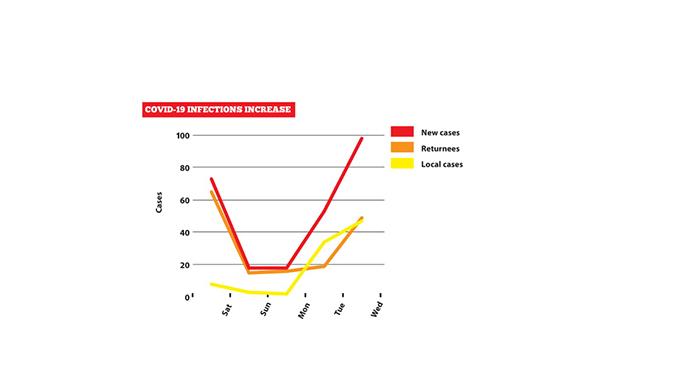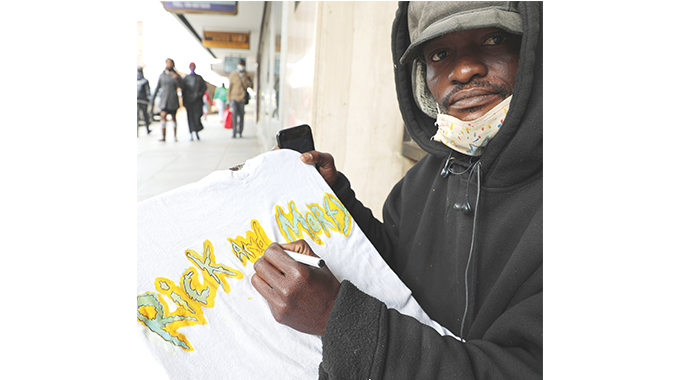Health experts fret over rise in local cases

Thandeka Moyo-Ndlovu & Nqobile Tshili, Chronicle Reporters
THE national Covid-19 death toll has risen to 18 with increased concern over the rise in local cases detected even among health care workers which has crippled operations at central hospitals in Bulawayo.
The trend of a majority of cases being from residents returning from outside the country has been reversed and more local cases are being reported. Five new cases that were reported on Saturday were discovered after post mortems.
Of the 18 deaths, seven were recorded in Bulawayo and eight in Harare, which remains the hardest hit province, with one each in Matabeleland North, Midlands and Mashonaland West.
Forty people tested positive for Covid-19 on Saturday including 13 health care workers from Mpilo Central Hospital in Bulawayo.
Health experts have warned that local transmissions point to a bigger problem as they show many people within society may not be aware that they are living with the virus.
They have said prevention measures like social distancing, wearing face masks and continuous hand washing should be stepped up to avoid disaster.
Safety measures should be upheld even when one is among friends and family because some people may have the virus without showing symptoms and may spread it to everyone who comes into contact with them.
Eighteen nurses working in the same ward at the United Bulawayo Hospitals (UBH) contracted Covid-19 after coming in contact with a male positive patient admitted in the area. They tested positive last Tuesday and 97 health workers went on self-isolation after coming into contact with the patient.
The outbreak of Covid-19 among health workers at UBH has crippled the hospital as it has been forced to operate with a skeletal staff.
There are more Covid-19 cases at Mpilo where some nurses contracted the infection after being in contact with an infected patient.
Mpilo has seen more than 197 health care workers being quarantined to control the spread of Covid-19.
According to the Ministry of Health and Child Care, the number of local cases is increasing with each passing day compared to the past days when most new cases emanated from returnees.
“The local 30 cases consist of 13 health workers from Mpilo 10, and three from quarantine centre in Matabeleland South province. Five of the local cases are contacts of known confirmed cases. Investigations are underway to establish the source of infection for the remaining 25,” read the statement.
“Today we regret to report five more deaths, three at community level and two facility level. These deaths occurred in Harare and Bulawayo provinces and were detected during routine post mortem as part our Covid-19 surveillance. We await the full post mortem reports of the direct causes of death.”
According to the Community Working Group on Health (CWGH) the surging number of cases of local transmission of Covid-19 at a time the country is easing lockdown restrictions is worrying.
“This week, Covid-19 positive figures spiked to an all-time high of over 980 cases with a significant number being local or community transmission. At this rate, and without stringent preventative measures, coupled with striking health workers and a broken health system, it is definitely a matter of time before Zimbabwe experiences high fatality rates,” said CWGH director Mr Itai Rusike.
“We would like to urge the Government and the striking nurses to find each other to ensure the provision of normal health care services in the country’s major health institutions to prevent the looming high case fatality rate,” he said.
Mr Rusike said the country cannot afford a job action when Covid-19 cases were surging as one life lost is one too many.
“CWGH is concerned by reports of citizens sneaking back into the country using the several unmanned entry points without going through the normal Covid-19 testing procedures to determine their health status. We fear that the returnees will further spread the disease to unsuspecting people in the communities countrywide,” said Mr Rusike.
Authorities at UBH said they were still in shock as to how nurses working in the same ward contracted Covid-19 which could also point to laxity of health workers while executing their duties.
They said while registered nurses were isolating at home, student nurses have been placed on mandatory quarantine at the hospital’s Richard Morris.
UBH acting executive officer Dr Narcissus Dzvanga said while the hospital had detected Covid-19 in four patients at the hospitals, the latest infections were puzzling.
He said the latest positive tests come after the hospital had recently conducted mass testing for 820 staff and patients who all tested negative for Covid-19.
“We continue to train our staff so that they remain conscious of the hazards of the pandemic. But we still have to find out how it happened because so many numbers came out from one ward. It means either habits or something was lacking because you can single out that this is the ward. Maybe they didn’t think that they are at risk and did not take due care,” he said.
“We expect an outbreak in what we call a medical ward where there are medical conditions not a trauma ward. Ellis is an orthopaedic trauma ward. We don’t expect them to have Covid-19, they don’t have temperatures, they are not coughing, they have broken bones, so it has taken us by surprise. So, I think it is a learning curve. What was unique in that ward that made it to have so many positives?”
Dr Dzvanga said the latest cases have negatively impacted on the hospital as it has to work with fewer staff, seconding nurses from some wards to work in others.
He said the 18 positive cases are coming from 42 student nurses and 55 registered general nurses who are all in self isolation.
“For student nurses they remain at the Richard Morris Paediatrics Unit which is our current quarantine centre. The student nurses cannot be sent home as they come from various parts of the country. Almost every province is represented among the students. So, it’s very difficult for them to go home and isolate,” said Dr Dzvanga.
He urged members of the public to exercise extra caution, wear personal protective equipment as the country could be in the Covid-19 peak season.
“People should take due caution. I’m one advocate for wearing a mask at all times not just in public places. Hand hygiene plays a big role in the control of this virus. And it’s a winter virus and this is the time for it to raise its ugly head.
“It’s worrying that it is affecting our staff but this is where we are supposed to find it. It was going to be more deadly if we are to find such numbers in the community. But if it is in a treatment centre, this is one of the occupational risks that are there and we have to rise and ensure that there is appropriate PPEs,” he said. – @thamamoe/@nqotshili








Comments